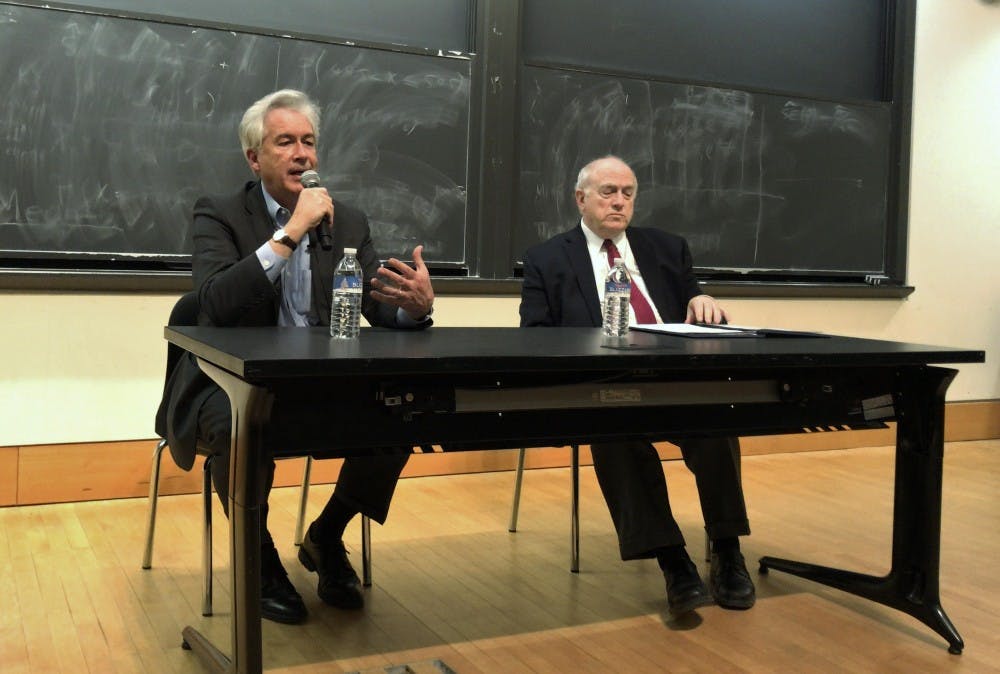According to former Ambassador William J. Burns, in an increasingly competitive and globalized world, diplomacy has never mattered more than it does today.
“We’re not the only geopolitically big kid on the block,” Burns said. “The United States has a better hand to play than any of our rivals if we play it wisely. The keys to that are not only our economic and military leverage ... our capacity to draw alliances and mobilize coalitions of countries is what sets us apart.”
On Wednesday, March 27, Burns delivered a harsh critique of the Trump administration’s foreign policy. He was interviewed by Ambassador Daniel Kurtzer, S. Daniel Abraham Professor of Middle Eastern Policy Studies and former ambassador to Israel and Egypt.
The 33-year veteran of the foreign service and former Deputy Secretary of State argued that the current administration is “squandering” the leadership abilities of the United States.
“There’s a dismissiveness that often comes out of the President himself toward professional diplomacy,” Burns said. He claimed that President Trump’s “diplomacy of narcissism” shows “weakness and manipulability” to autocrats around the world.
Burns highlighted Vladimir Putin’s attempt to take advantage of the weakness by interfering in the 2016 presidential election.
Burns called the attempt “a combustible combination of grievance, ambition, and insecurity,” and said that Putin took it personally when then-Secretary of State Hillary Clinton spoke out in favor of free speech while Russians protested Putin’s third term.
“It reinforced his convictions that the United States was out to keep Russia down,” Burns said. “His view was that we had intervened in Russia’s moment of weakness [in the 1990s]. Then he saw polarization and dysfunction in our political system, and he saw a way to take advantage of it and sow chaos.”

Burns expressed optimism that the Russian middle class, now stagnant in the face of Putin’s single-sector economy, might eventually seek healthier relationships with the United States.
“As it’s important not to give in to Putin, it’s also important not to give up on the Russia that lies beyond Putin,” he said.
In light of his new book, “The Back Channel: A Memoir of American Diplomacy and the Case for Its Renewal,” Burns discussed the various advantages and disadvantages of dealing in secret.
In the case of the Iranian nuclear deal, Burns said that excessive baggage between the two countries necessitated covert talks, and pressure mounted as he and his group of five diplomats navigated the negotiations without the help of the Department of the Treasury.

“That kind of very tight circle was really essential, in this day and age, to be able to preserve the discretion of those talks,” Burns said. “While it was a controversial decision to do this secretly at that stage, I’m convinced to this day that we would not have made the progress that we did had it not been for doing it quietly.”
Burns said that the deal, in particular its watchdog provisions, was the best of the available alternatives to eliminate the immediate threat of a nuclear Iran.
Burns emphasized the unique diplomatic challenges between prioritizing values and interests when dealing with autocratic regimes.
“It’s an important part of who we are as Americans not to check our values at the door,” he said. “We may not always be able to get our way, we may not be able to help every human rights organization that deserves our help, but I do think it’s important that we speak up on those issues.”
With only two out of the six Department of State bureaus having a permanent secretary assigned, Burns expressed concern over the diplomatic ability of the U.S. to speak out under this administration.
Burns also noted the importance of diversity in foreign service. At the start of Burns’ career, 90 percent of his peers were white, and 75 percent were male.
“We’ve begun to make progress in terms of women and men in the foreign service, but we’re still woefully insufficient in terms of ethnic diversity,” he said. “We’d get a lot further in American Foreign Service if we looked like the society we’re representing.”
Burns concluded with an encouragement to consider a career in public service.
“Anybody who joins the foreign service now can face a really exciting opportunity to renew diplomacy and to rebuild after some of the wreckage of recent years,” Burns said. “Nothing can make you prouder to serve your country with honor.”
The talk took place in the Friend Center Room 101 at 4:30 p.m. on Wednesday, March 27.








